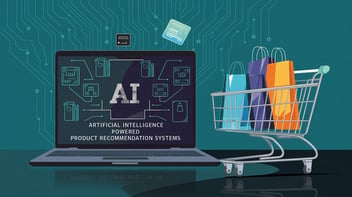The retail landscape is rapidly evolving, with technology playing an increasingly central role in enhancing customer experience. One of the most influential technologies in this space is the product recommendation engine, which tailor shopping experiences to meet each customer’s unique needs and preferences. This article explores the importance of recommendation engines and their impact on retail.
Why Recommendation Engines Matter in Retail
Today’s consumers expect a personalized shopping experience, and recommendation engines are essential in meeting this demand. A recent survey of over 2,700 commerce leaders revealed that the majority view product recommendations as critical for staying competitive. Personalized recommendations not only improve customer satisfaction but also build brand loyalty by creating an experience tailored to each customer.
Enhanced Customer Loyalty: Personalized recommendations lead to a stronger emotional connection with the brand, making customers more likely to return.
Improved Brand Image: A brand that “knows” its customers and meets their unique needs can strengthen its reputation in the market.
How Recommendation Engines Work
A product recommendation engine is essentially a data-driven tool that predicts and suggests products to customers based on various indicators, such as browsing history, past purchases, and demographic information. These systems enable retailers to
deliver a highly personalized shopping experience, often translating into higher sales and stronger customer relationships.
The Role of Advanced Analytics and Machine Learning
Modern recommendation engines have become highly sophisticated, utilizing machine learning and advanced analytics to predict what customers are likely to buy next. This predictive power allows retailers to
stay ahead of customer preferences, creating a more dynamic and engaging shopping experience.
Adaptive Algorithms: Recommendation engines learn from user interactions in real-time, adjusting suggestions based on immediate feedback to keep recommendations relevant.
Seasonal Adjustments: These systems can also factor in seasonal trends, ensuring that recommendations align with current demand.
The Omnichannel Advantage in Retail
Omnichannel strategies are essential for retailers looking to provide a
seamless shopping experience across multiple platforms, such as online stores, mobile apps, and physical outlets. By adopting an omnichannel approach, retailers can leverage data from various touchpoints to create a consistent and personalized experience.
Unified Customer Experience: Integrating multiple channels ensures that customers have a seamless journey, regardless of where they engage with the brand.
Stronger Brand-Customer Relationship: A holistic view of the customer journey fosters a deeper brand connection, leading to long-term customer loyalty.
Commerce Cloud Solutions for Enhanced Recommendations
Commerce Cloud solutions are powerful platforms that enable retailers to implement recommendation engines with ease, providing essential infrastructure and scalability. During peak seasons, these platforms can adjust resources dynamically, maintaining performance even during traffic surges.
Scalability During Peak Times: Cloud solutions ensure smooth performance, particularly during high-traffic periods, supporting an uninterrupted customer experience.
Real-Time Analytics: Advanced analytics tools in cloud solutions allow businesses to monitor the effectiveness of campaigns and
refine strategies in real-time.
Interoperability: Cloud platforms often integrate with third-party services, creating a cohesive retail ecosystem that streamlines processes such as
inventory management and checkout.
Conclusion: Maximizing Revenue through Personalization
In summary, product recommendation engines are vital for retailers seeking to
enhance customer experience and drive revenue. As retail technology continues to evolve, the role of recommendation engines in creating a personalized and engaging shopping experience will only become more essential.
Facilitating an e-commerce transition with Pacific Data Integrators (PDI)
Transitioning your retail endeavour into e-commerce can seem like a daunting process, but with Pacific Data Integrators (PDI), it becomes a streamlined and supported journey. Partnering with PDI ensures a seamless transition and enduring success, turning challenges into opportunities. Discover how PDI's tailored retail solutions can transform your business by consulting with our experts today.
You can book a consultation today by visiting us at PDI.
Posted by PDI Marketing Team
Pacific Data Integrators Offers Unique Data Solutions Leveraging AI/ML, Large Language Models (Open AI: GPT-4, Meta: Llama2, Databricks: Dolly), Cloud, Data Management and Analytics Technologies, Helping Leading Organizations Solve Their Critical Business Challenges, Drive Data Driven Insights, Improve Decision-Making, and Achieve Business Objectives.






